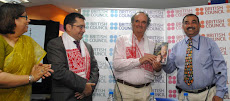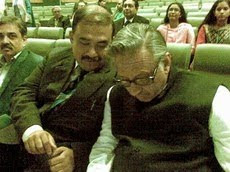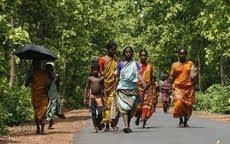The drama surrounding the return of ULFA chairman Arabinda Rajkhowa to Assam has exposed both the media and the government in no uncertain terms. On the day, he was picked up by the Rapid Action Battalion (RAB) in Dhaka, I reported in the BBC that Rajkhowa has been put under "house arrest" with his family members and the other ULFA men and family members. The BBC Online still has the story on its South Asia page.
 The story remained unchanged on the site, even as the Indian and northeastern media went berserk with wild stories. Some TV channels even gave graphic descriptions of how Rajkhowa being flown to Delhi - even the normally reliable PTI did a story from Agartala saying Rajkhowa flown to Delhi. The media were further encouraged to speculate of Rajkhowa's so-called arrival in Delhi by the Home Minister Chidambaram's parliament statement that a positive political statement was expected of the ULFA fairly soon. When one BBC duty editor drew my attention to the flurry of media reports from all over the country suggesting Rajkhowa was already in Delhi, I warned him against picking up any of those stories. This can only be explained by one startling fact - no Indian or northeastern journalist has any real worthy source in Bangladesh. I have many. One RAB colonel kept telling me - Aare Dada, ekhono amader hathe najarbandhi acche. And this friend told me on Thursday night that the whole group, including Rajkhowa and his family, were been moved towards Dawki. So on Friday morning, I alerted the BBC about the move to bring Rajkhowa to Assam.
The story remained unchanged on the site, even as the Indian and northeastern media went berserk with wild stories. Some TV channels even gave graphic descriptions of how Rajkhowa being flown to Delhi - even the normally reliable PTI did a story from Agartala saying Rajkhowa flown to Delhi. The media were further encouraged to speculate of Rajkhowa's so-called arrival in Delhi by the Home Minister Chidambaram's parliament statement that a positive political statement was expected of the ULFA fairly soon. When one BBC duty editor drew my attention to the flurry of media reports from all over the country suggesting Rajkhowa was already in Delhi, I warned him against picking up any of those stories. This can only be explained by one startling fact - no Indian or northeastern journalist has any real worthy source in Bangladesh. I have many. One RAB colonel kept telling me - Aare Dada, ekhono amader hathe najarbandhi acche. And this friend told me on Thursday night that the whole group, including Rajkhowa and his family, were been moved towards Dawki. So on Friday morning, I alerted the BBC about the move to bring Rajkhowa to Assam. I instantly knew Rajkhowa had not agreed to start taIks on the terms of the Indian government by accepting to drop the demand for Assam's sovereignity - as indeed Chidambaram had suggested. That is why he was been moved towards Assam, so that he could be brought to trial. Or else he would have been taken to Delhi to start talks with a grant of safe passage. But even as Rajkhowa and the other ULFA men and women were been taken towards Dawki, all the morning papers were reporting the details of talks he has already had with Indian officials in Delhi. The entire media, except myself and a few others like Bengal Newz who reported details given by me, were proved wrong - and it also became clear manufacture news and let their imagination run riot. A Kolkata based English paper even quoted unnamed officials in the Intelligence as giving graphic details about Rajkhowa's secret parleys in Delhi.
I instantly knew Rajkhowa had not agreed to start taIks on the terms of the Indian government by accepting to drop the demand for Assam's sovereignity - as indeed Chidambaram had suggested. That is why he was been moved towards Assam, so that he could be brought to trial. Or else he would have been taken to Delhi to start talks with a grant of safe passage. But even as Rajkhowa and the other ULFA men and women were been taken towards Dawki, all the morning papers were reporting the details of talks he has already had with Indian officials in Delhi. The entire media, except myself and a few others like Bengal Newz who reported details given by me, were proved wrong - and it also became clear manufacture news and let their imagination run riot. A Kolkata based English paper even quoted unnamed officials in the Intelligence as giving graphic details about Rajkhowa's secret parleys in Delhi. Paresh Barua spoke to me early on Friday, rejecting any talk unless the issue of Assam's sovereignity was discussed. He was hopeful that chairman Rajkhowa would not fall into Indian trap. Now those who know Barua and Rajkhowa and the chemistry between them will find it difficult to accept that Rajjkhowa can take an independent initiative.
Paresh Barua spoke to me early on Friday, rejecting any talk unless the issue of Assam's sovereignity was discussed. He was hopeful that chairman Rajkhowa would not fall into Indian trap. Now those who know Barua and Rajkhowa and the chemistry between them will find it difficult to accept that Rajjkhowa can take an independent initiative.In 1992, he did take the initiative to visit Delhi but when he and Anup Chetia returned to Dhaka, both were badly humiliated by Paresh Barua. Both Rajkhowa and Chetia were made to stand in the Buriganga and do penance for their sins (pap dubolei thio kari rakhichile Burigangat).
 This time on, Rajkhowa seems to have finally backed out again. Despite being in huge trouble in Bangladesh, much of their funds frozen by Hasina's government, Rajkhowa will perhaps not take the risk of dropping the sovereidemand and start talks with Delhi.
This time on, Rajkhowa seems to have finally backed out again. Despite being in huge trouble in Bangladesh, much of their funds frozen by Hasina's government, Rajkhowa will perhaps not take the risk of dropping the sovereidemand and start talks with Delhi.Bangladesh wanted to hand him over on Day one after he was picked up. But Dhaka did not know where to send the ULFA chairman and his entourage To Delhi or to Assam. Because Indian intelligence officials in touch with Rajkhowa in Dhaka were trying to cajole and pressurize him into agreeing to start talks with India by dropping the sovereignity demand. For three days, the drama was unfolding in a small house in Dhaka's Gulshan locality - and not in some intelligence safehouse in Delhi as was being reported by the Indian media. That is why Rajkhowa was allowed to retain his mobile phones so that he could speak to other ULFA leaders. But since he did not get a favourable response from them and all backed Paresh Barua, the ULFA chairman had to fall in the overall party line of not talking to India unless the issue of Assam's sovereignity was included in the agenda for talks. So Delhi finally told Dhaka to send the ULFA entourage back to Assam.
And all this while my RAB colonel kept telling me the truth - that the ULFA leaders were very much in Dhaka.
 Peace talks cannot be done by holding a gun to someone's head. You can interrogate someone that way but talk in such circumstances. Talks to succeedd an environment of confidence. Also no talks have worked in Northeast if the group was split. I know some senior officials in Assam and Delhi have advocated to Chidambaram the minus one formula. Isolate Paresh Barua and start talks with Rajkhowa. They dont realise Paresh Barua still commands the ULFA - inspite of all the reverses and failures. By trying to isolate Barua, these great minds of Indian administration have actually ended up isolating Rajkhowa. No accord can work unless those who sign it are capable of implementing it. And split organisations pose greater problems for resolving conflicts as all our past experiebnce in the Northeast and elsewhere in India have shown.
Peace talks cannot be done by holding a gun to someone's head. You can interrogate someone that way but talk in such circumstances. Talks to succeedd an environment of confidence. Also no talks have worked in Northeast if the group was split. I know some senior officials in Assam and Delhi have advocated to Chidambaram the minus one formula. Isolate Paresh Barua and start talks with Rajkhowa. They dont realise Paresh Barua still commands the ULFA - inspite of all the reverses and failures. By trying to isolate Barua, these great minds of Indian administration have actually ended up isolating Rajkhowa. No accord can work unless those who sign it are capable of implementing it. And split organisations pose greater problems for resolving conflicts as all our past experiebnce in the Northeast and elsewhere in India have shown. Chief Minister Tarun Gogoi was right to say that the Naga talks happened without Phizo - so why not Assam talks without Barua. But Gogoi must look back to the fate of the 1975 Shillong Accord. It did not work. It did not lead to a settlement of the Naga problem. History have a bad habit of repeating itself.
န Photos : AP, Subhamoy Bhattacharjee and BBC
( Subir Bhaumik is the BBC's East India Correspondent and a known military intelligence observer )







